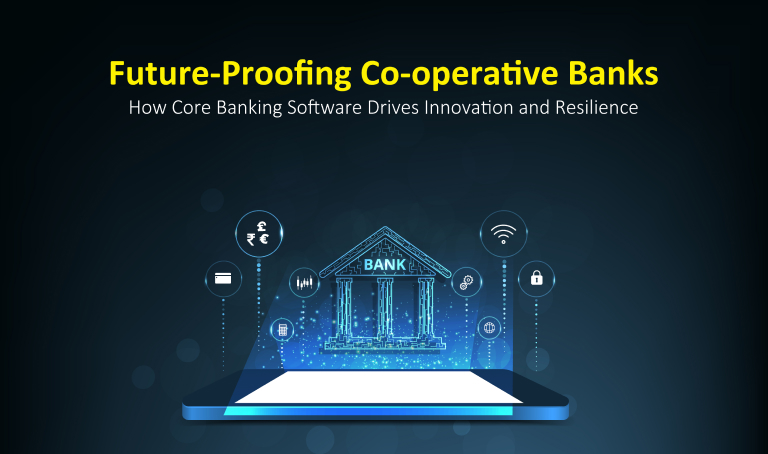The banking industry is at a crossroads because it faces drastically changed customer expectations and yet many of the co-operative banks continue to operate with legacy systems which are outdated. Today’s customers expect instant transactions, personalized experiences, and seamless digital interactions all of which are impossible with outdated core banking systems. The resultant technological disconnect creates an ever-widened chasm that threatens to remove any bank's competitive viability as well as its success over time.
The Downfall of Legacy Core Banking Systems
Core legacy banking systems, most of which were built decades ago, represent significant barriers to innovation in banking and customer satisfaction. These outdated systems operate in technology silos, thus creating many issues that aggregate over time.
Limited Agility and Integration Challenges
Probably the biggest operational challenge is the rigidity of legacy systems. These older systems cannot easily integrate with modern technologies, including mobile banking applications, cloud computing infrastructures, and APIs. This technological inflexibility allows fintech startups to move faster than co-operative banks that do not meet the changing demands of customers who increasingly expect a seamless banking experience similar to that offered by their most-used consumer applications.
Data Silos and Fragmented Customer Views
Legacy systems trap customer data in isolated databases, hence creating data silos that hinder co-operative banks from building a comprehensive profile of their customers. This fragmentation refocuses the banks' capacity to provide personalized service, implement effective marketing strategies, or make data-driven business decisions. Co-operative banks cannot offer the tailored experiences that today’s consumers expect and demand without a holistic view of customer relationships.
Astronomical Maintenance Costs
The cost of supporting legacy systems is staggering. Most co-operative banks spend a majority of their IT budgets on the maintenance of these outdated platforms. Legacy solutions cost banks more to operate than modern core banking systems. This over expenditure on maintenance leaves banks with only a pittance to play with for innovation and growth initiatives, thereby creating a vicious cycle where older technology eats up money that could otherwise be used to drive competitive advantage.
Competitive Disadvantage in the Fintech Era
While traditional co-operative banks are weighed down by legacy anchors, their challengers are neobanks and fintech startups that use modern technology stacks. These enable product development at a fast pace, instant service delivery, and an even better experience for the users. On the other hand, co-operative banks burdened with legacy infrastructure cannot match this agility, which makes customers unhappy and gradually erodes their market share.
The Rise of Modern Core Banking Software
Modern core banking software marks a significant paradigm shift in the operational dynamics of financial institutions within the digital economy. Such platforms are designed with flexibility, scalability, and seamless integration as core foundational design principles.
Open Innovation through API Integration
The open innovation ability is what makes a modern core banking software different from its legacy counterpart. With the use of advanced APIs, these systems act as digital ecosystems that allow integration with creative fintech solutions and third-party services without any hassle. For instance, co-operative banks can directly embed budgeting apps within their core systems so that customers can access and manage their finances all in one platform.
Flexibility and Rapid Deployment
Contemporary core banking software provides co-operative banks the capability of adding new features or upgrading existing ones without needing a complete overhaul of the system. It is this modularity that greatly speeds up the time-to-market for any new products or services, thereby giving banks the operational agility they need to react rapidly to market opportunities and changing customer needs.
Enhanced Security and Compliance
Security considerations have indeed been a popular debate in the process of modernization of underlying infrastructure of core financial systems; however, these actually are greatly mitigated in modern core banking systems. Such systems are also more compliant with regulations since their designs permit seamless updates without disruption of business activities, thereby themselves conforming to regulation.
Operational Benefits and Strategic Advantages
Contemporary core banking software offers considerable operational advantages that enhance a co-operative bank's competitive position as well as its financial performance in general.
Automation and Efficiency
Automation capabilities enhance the typically manual tasks of account reconciliation, loan processing, compliance reporting, and risk assessment. Such comprehensive automation reduces the operational costs involved and also diminishes the chances of human error in vital financial activities.
Innovation Acceleration
The acceleration of innovation may be the most significant long-term benefit associated with modern core banking software. Their open API architecture allows co-operative banks to quickly incorporate new fintech solutions, innovate products at speed, and dynamically respond to changes in market conditions. This operational agility is of the essence for effectively competing against agile fintech startups and consistently satisfying evolving customer expectations.
The Path Forward: Strategic Implementation
The transition from legacy to modern core banking software involves much more than a technological upgrade—it is a strategic imperative for co-operative banks that want to maintain a sustainably competitive edge in an increasingly digital financial ecosystem.
Co-operative banks that rely on legacy systems will increasingly be outmaneuvered by more agile competitors and lose customer interest to providers that can offer better digital experiences. As the financial services sector continues its digital transformation, modern core banking software provides the technological foundation co-operative banks need to succeed in tomorrow's marketplace.
At Nelito Systems, our core banking solution is designed with these exact imperatives in mind—bringing together automation, flexibility, and future-ready technology. With an open architecture, robust feature set, and a strong focus on user experience, our platform empowers co-operative banks to modernize their operations, drive innovation, and build lasting customer trust in an increasingly digital financial world.



Comments :